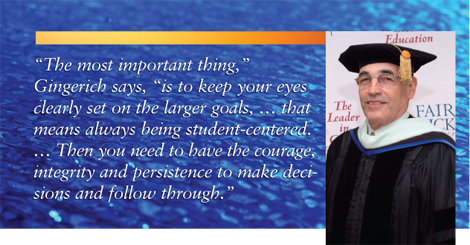


An ‘Accidental’ Assignment
During his time at UTEP, Gingerich was “accidentally” thrust into his first administrative position. “There was a faculty feud about who should be in charge of the Center for InterAmerican Studies. I had some initial credentials in Mexican culture and as a junior faculty member I hadn’t had a chance to antagonize anybody, so I was selected. I was able to forge alliances with important Chicano-studies scholars, and we enjoyed several productive years.”
Gingerich credits the prominent Chicano writer and then-academic vice president at UTEP, Tomás Rivera, with providing him his most enduring mantra for academic management. Rivera told him, “Don’t work harder, work smarter.”
These early administrative experiences and insights helped him to land a spot at St. John’s University. His wife had been appointed to the faculty in Latin American literature there in 1985, and, in 1987, he was offered an opportunity to be the associate dean of the Graduate School of Arts and Sciences.
Gingerich enjoyed his new role. “I was pretty good at bringing faculty and students together and especially liked working with a wide range of people across the disciplines.”
He would go on to serve as acting dean of the Graduate School of Arts and Sciences and, after a national search, he was selected dean. In 1998, he became associate provost for research, graduate studies and international programs. Then, in 2001, he was named vice provost for graduate studies and research.
One of his more satisfying duties, he says, was serving as the secretary and then the chair of the Institutional Review Board, the regulatory body that reviews research involving human subjects. “I had to become knowledgeable in research ethics and various scientific issues. It was fascinating.”
Not content to leave the classroom for long, he became associate professor of English and earned the rank of full professor in 1997. In the spring of 2005, his last semester at St. John’s, he says he taught one of his most enjoyable courses, a senior seminar on Emily Dickinson and Walt Whitman. A big fan of 19th-century American poets, he says, “All of my research and studies of indigenous cultures come together for me in American poetry.”
Gingerich is a member of various poetry associations, and he’s published many articles on contemporary poetry, focusing in particular on New York writers like Armand Schwerner.
Family Ties
The prospect of remaining close to the exciting cultural opportunities within the New York metropolitan area was a big bonus for Gingerich as he moved to FDU. When not immersed in academic activities, he and his wife enjoy going to movies, the theater and dining out. But it’s not all about the city scene for Gingerich. He’s also an outdoorsman who loves biking, hiking and fly-fishing.
Gingerich says his family was very supportive of the move to FDU. Alina is a professor and continues to chair the Committee on Latin American and Caribbean Studies at St. John’s University.
Their daughter, Tanya, is married and in her third career. After dancing with the New York City Ballet and acting, she now is a field reporter for CBS News under the name Tanya Rivero.
Their son, Daniel, is following his parents’ academic path. He is writing his dissertation in comparative politics, focusing on Latin America, at Harvard University and looking to become a college professor.
If he really wants to follow in dad’s footsteps, he may eventually head toward academic administration. There, he can guide and manage critical functions that directly impact the future of an entire university — not to mention the education and careers of countless students.
“The most important thing,” Gingerich says, “is to keep your eyes clearly set on the larger goals, and in the case of the University, that means always being student-centered. You also must have a vision, which we do. Then you need to have the courage, integrity and persistence to make decisions and follow through.” And, he could add, you must continually be searching for the bottom of Walden Pond.
FDU Magazine Home | Table of Contents | FDU Home | Alumni Home | Comments
©Copyright 2006 Fairleigh Dickinson University. All rights reserved.
For a print copy of FDU Magazine, featuring this and other stories, contact Rebecca Maxon, editor,
201-692-7024 or maxon@fdu.edu.